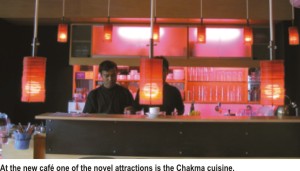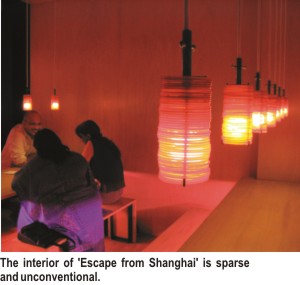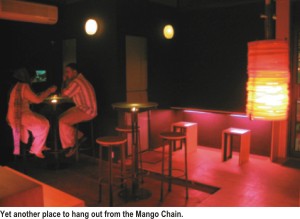|
Eating
Out
Escape
into the Cafe Culture
Farhana
Ahmad
Have
you visited the new baby in the Mango family? In case you
are wondering the origins of such geneology, the Mango Family
refers to the two sister cafes with the name of that exotic
fruit. Its name is Escape from Shanghai! This intriguing name
has most people baffle but it also gets the creative process
working overtime. People have guessed a whole host of things.
From "oh maybe it's a movie title', to "maybe it's
a noodle bar", "hey are they serving Chinese food",
"are the people Taiwanese?" the speculations have
been endless. The most bizarre theory was "it must be
that two partners who belonged to a restaurant called Shanghai
and now they have split up and one of the partners have opened
up this restaurant and named it Escape from Shanghai to commemorate
the situation"! What is interesting is the fact that
this name has generated the curiosity of the people to want
to go investigate. Maybe that's what the owner wanted when
he was naming this place! I was so fascinated by this title
I just had to go and get the answers from the horse's mouth.
This being the enigmatic and charismatic brains behind the
Mango chain Salauddin Ahmed. Over a cup of freshly brewed
coffee, we discussed dreams, aspirations, history, Dhaka,
and a café cum restaurant named Escape from Shanghai.
 Curious
as ever about how such Euro influenced cafes came into existence,
which reminds us so poignantly of a neighbourhood pub in any
city in Europe, I asked Salauddin to share with us what made
him venture into such a project. The Mango in Dhanmondi was
started in November 9, 2000. It came from his constant frustration
with the fact that there was actually no place to hang out
in Dhaka. Salauddin always felt that a café is a place
to hang out, drink good coffee, read magazines or the newspaper,
meet new people. But people said this is Bangladesh not America.
"But I always feel, hanging out and making new friends
is universal", says Salauddin. "Dhaka is a city
that makes you lonely very easily. It is so crowded, so unorganised.
So, every day after work, in my own time I would draw collages
in an attempt to design a place that would close some of the
gaps, the missing platforms of Dhaka." The rest, as they
say is history after Mango came into being. It was an instant
success. Curious
as ever about how such Euro influenced cafes came into existence,
which reminds us so poignantly of a neighbourhood pub in any
city in Europe, I asked Salauddin to share with us what made
him venture into such a project. The Mango in Dhanmondi was
started in November 9, 2000. It came from his constant frustration
with the fact that there was actually no place to hang out
in Dhaka. Salauddin always felt that a café is a place
to hang out, drink good coffee, read magazines or the newspaper,
meet new people. But people said this is Bangladesh not America.
"But I always feel, hanging out and making new friends
is universal", says Salauddin. "Dhaka is a city
that makes you lonely very easily. It is so crowded, so unorganised.
So, every day after work, in my own time I would draw collages
in an attempt to design a place that would close some of the
gaps, the missing platforms of Dhaka." The rest, as they
say is history after Mango came into being. It was an instant
success.
As traffic
makes mobility impossible, countless requests came from the
Gulshan crowd to open a café for them in their part
of town. But Salauddin was not that eager as he assumed someone
else would open a café for the Gulshanites. After waiting
for nearly three and a half years, and after repeated pressure
from the Gulshan regulars, the second Mango was born on October
1, 2004. Without any advertisement from their part, both the
Mangos have become much talked about places in Dhaka.
But why
another café/restaurant in virtually one and a half
month's time? "Well, my brother, Shirajuddin Ahmed, became
my legal partner", says Salahuddin. "We are a good
team, a good combination. I am the creative part of the partnership,
while he is the business part. After I complete the design
and put together the place, he takes care of the running and
the day to day management. In this way the two of us compliment
each other. He takes a lot of trouble off my shoulder. The
old Savera was one of my favourite restaurants in Dhaka. After
it got burnt, an offer came to me to rent the space.
Then
my brother and I discussed whether we would be able to start
a new place. We thought of a café cum restaurant where
there would be a fusion of local food with the café
Mango menu, so that it would work for long hours. People could
come here for breakfast, midmorning snack, lunch, afternoon
coffee and dinner. We didn't want to open a solely Bangladeshi
or a solely Chinese restaurant. We wanted to step into new
frontiers, understand cultures and ethnicity. To break the
concept that our tribal food are not Bangladeshi food, Escape
from Shanghai would have quite a number of Chakma dishes on
its menu."
 But
why 'Escape from Shanghai'? "Being around food quite
a bit, my understanding is that eating out in this country,
the first and the last choice remain Chinese and in between
maybe Bangla, Thai or Indian. The name of the restaurant focuses
on the majority who invest in our restaurants. I wanted to
break away from the established idea that eating out has to
be Chinese." The brothers did their share of research
into the Chakma culture and heritage. "We made quite
a few trips to Rangamati. We went food shopping there, went
to the villages to see how they cook, serve and eat. We came
to the conclusion that it would not be possible for us to
recreate the total ambiance. So somehow we adjusted to the
given boundaries and limitations. The chef and some waiters,
for instance are from our tribal community." But
why 'Escape from Shanghai'? "Being around food quite
a bit, my understanding is that eating out in this country,
the first and the last choice remain Chinese and in between
maybe Bangla, Thai or Indian. The name of the restaurant focuses
on the majority who invest in our restaurants. I wanted to
break away from the established idea that eating out has to
be Chinese." The brothers did their share of research
into the Chakma culture and heritage. "We made quite
a few trips to Rangamati. We went food shopping there, went
to the villages to see how they cook, serve and eat. We came
to the conclusion that it would not be possible for us to
recreate the total ambiance. So somehow we adjusted to the
given boundaries and limitations. The chef and some waiters,
for instance are from our tribal community."
Some people
say that the menu items are a little pricey. Salauddin refutes
this allegation. " The two Mangos and Escape from Shanghai
are for those who desire the place, those who are willing
to take the time." Like he so aptly puts it, "you
don't need to wear a suit or speak English, the cafés
are for those who enjoy being with friends and enjoy being
alone. I feel our prices are less than a lot of other places.
It's not the coffee or tea per se, rather the experience of
the cup of tea or coffee. Our standard is above other places.
We like to share this standard with other people and not look
at it from the business angle. A good cup of tea in a clean
cup has its own standard. But this maintenance costs money."
Salauddin
feels a place to hang is something that many city people have
been missing. The Mango cafés have been able to create
an atmosphere where strangers become friends over cups of
fragrant coffee. The pull of the place is not only the brews
and the brownies but also the easy-going cosmopolitan ambience,
the feeling that you could be anywhere in the world. The staff
is cooperative and friendly. The music is very tasteful, oftentimes
the theme being, instrumental in the morning, jazz at lunchtime
and fusion in the afternoon. At these cafes talented artists
can come and exhibit their work on the walls.
Salauddin
tells us that both the Mangoes are very much a neighbourhood
thing. "As an architect, I always try to promote new
ideas and the possibility of new ideas. I will always attempt
to show the beauty of space and the possibility of meeting
of minds. Each work that I do is my direct attempt to let
the user understand it from their position, to be able to
relate to the place."
 So,
what is the trademark style of this designing whiz hell-bent
on giving Dhakaites a place to hangout? "I look for the
human quality in my work, as if I am looking at a person.
I create basic layers and basic structures." It's interesting
how he has used lights and lampshades in all the three places.
There are light bulbs under tables, shades made from recycled
bottles and glass bangles! "As you sit you don't see
yourself but the person across you. So I adjusted the light
to suit that. It's all about creating the mood. The light
is hung from a particular height to produce enough light to
light the food and to see the person sitting across. In all
the cafés I have designed, it is the refinement of
one idea, with each creation there is elevation of the ideas."
Another trademark of Salauddin's is the avant-garde washroom
in each establishment. "If the washroom is interesting,
washing hands become special. I felt it was my responsibility
to take up the challenge of redefining the idea of a washroom
in an eating place with the idea that the little time you
spend there should charge your mind." So,
what is the trademark style of this designing whiz hell-bent
on giving Dhakaites a place to hangout? "I look for the
human quality in my work, as if I am looking at a person.
I create basic layers and basic structures." It's interesting
how he has used lights and lampshades in all the three places.
There are light bulbs under tables, shades made from recycled
bottles and glass bangles! "As you sit you don't see
yourself but the person across you. So I adjusted the light
to suit that. It's all about creating the mood. The light
is hung from a particular height to produce enough light to
light the food and to see the person sitting across. In all
the cafés I have designed, it is the refinement of
one idea, with each creation there is elevation of the ideas."
Another trademark of Salauddin's is the avant-garde washroom
in each establishment. "If the washroom is interesting,
washing hands become special. I felt it was my responsibility
to take up the challenge of redefining the idea of a washroom
in an eating place with the idea that the little time you
spend there should charge your mind."
What drives
this creative genius? "The foolishness in me, that I
believe so much in my own culture, the undying curiosity of
the possibilities of knowing my own culture." Future
plans? "The everlasting hope to see other people coming
forward to do their bit for the city. "I truly believe
anyone can do it and can have the support to run it."
Satisfied
with the pleasant tête-à-tête with Salauddin
Ahmed, I come away with the hope that he continues to design
and open more places with the same character, ambiance, allure,
attitude and freshness of the Mango chain.
Copyright
(R) thedailystar.net 2004
|
